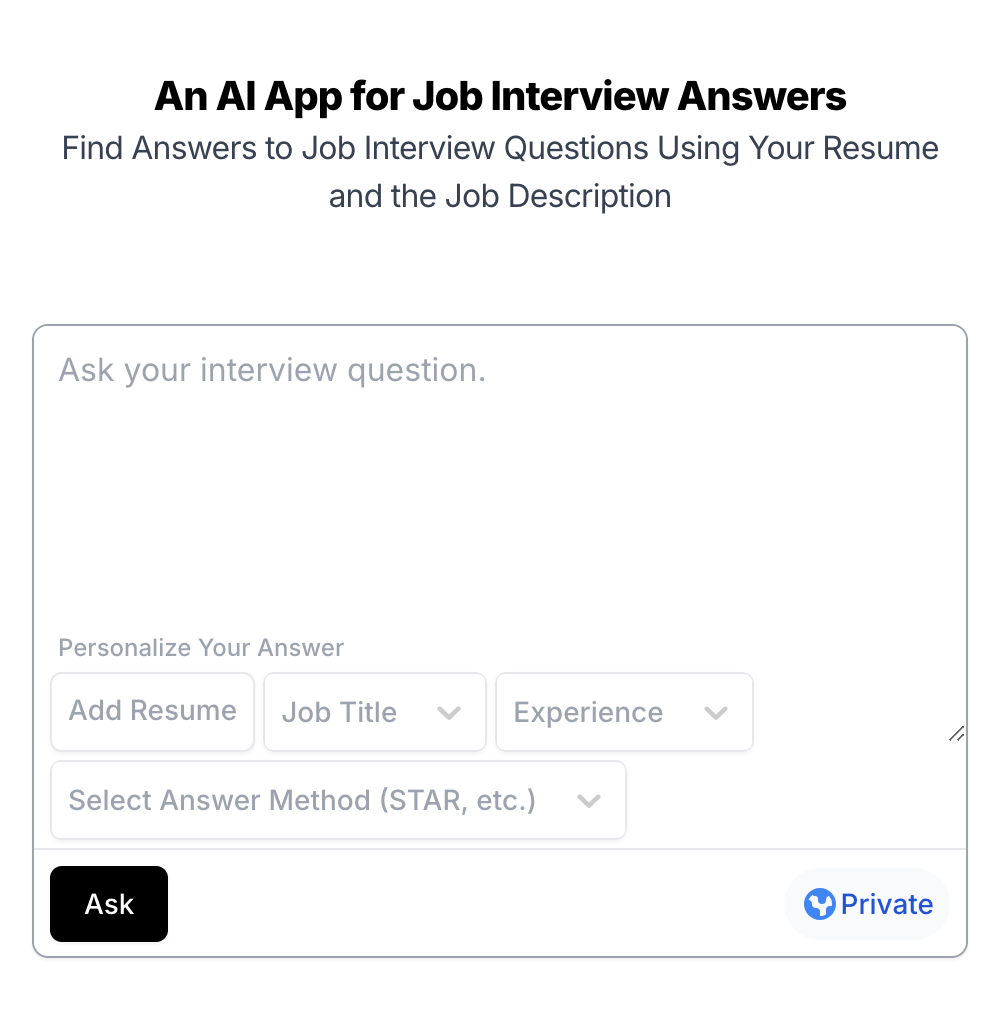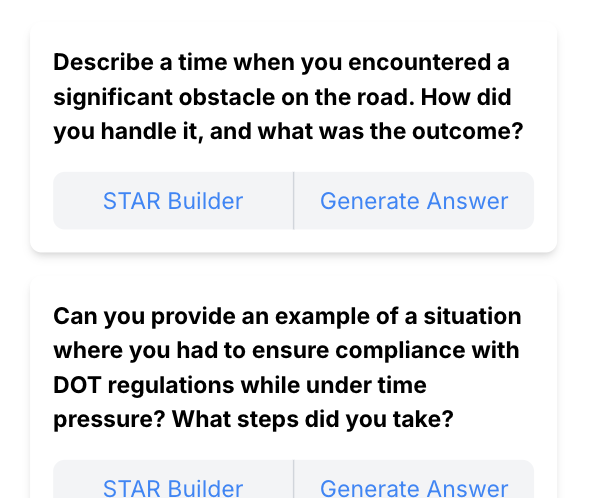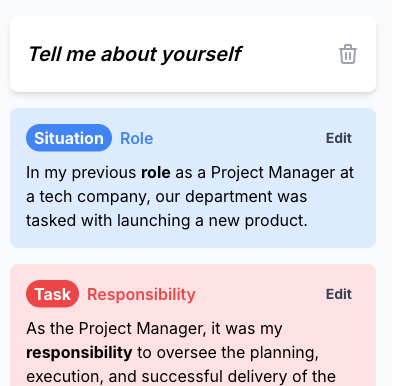
Experience Interview Questions: What You Need to Know
Fri Aug 23 2024•Author: InterviewPro AI
Table of Contents
- What Are They?
- Common Examples
- Answer Length
- What to Avoid Saying
- Possible Follow-Ups
- More Follow-Up Questions
- When They're Asked
- Who Asks Them
- Why They Matter
- How to Answer Well
- Answer Structure
What Are They?
Experience interview questions ask about your past work situations. Employers use them to understand how you've handled real challenges and tasks. They want to see how your past experiences relate to the job you're applying for.
5 Common Examples
- Can you describe a time when you had to meet a tight deadline?
- Tell me about a project you're proud of and why.
- Have you ever had to deal with a difficult coworker? How did you handle it?
- What's the biggest challenge you've faced in your career so far?
- Can you give an example of a time you showed leadership skills?
Answer Length
Aim to keep your answer to about 2-3 minutes. This gives you enough time to describe the situation, your actions, and the results without going into too much detail. Your answer should be concise but informative.
What to Avoid Saying
Don't say these things when answering experience questions:
-
Don't give vague answers Bad example: "I've dealt with lots of challenges." Why it's bad: This doesn't provide specific examples or show your skills.
-
Don't speak negatively about past employers Bad example: "My last boss was terrible, so I had to do everything myself." Why it's bad: This makes you look unprofessional and hard to work with.
-
Don't exaggerate your role Bad example: "I single-handedly saved the company millions." Why it's bad: Overstatement can make you seem untrustworthy.
-
Don't say you have no relevant experience Bad example: "I've never done anything like that before." Why it's bad: Try to find transferable skills from other experiences.
-
Don't give irrelevant examples Bad example: Talking about personal life when asked about work experience. Why it's bad: This shows you might not understand the question or job requirements.
-
Don't focus only on the problem Bad example: Spending most of your answer describing the issue, not your solution. Why it's bad: Employers want to know how you solve problems, not just identify them.
-
Don't forget to mention results Bad example: Describing what you did without saying what happened. Why it's bad: Results show the impact of your actions.
Show that you can apply your past experiences to new situations and learn from challenges.
Possible Follow-Ups
After you answer, the interviewer might ask more about your experience. They could ask about:
-
Specific details: They might want more information about certain parts of your story. Example: "Can you tell me more about how you approached that challenge?"
-
Your role: They could ask what exactly you did in the situation. Example: "What was your specific role in that project?"
-
The outcome: They might ask what happened as a result of your actions. Example: "What was the final result of your approach?"
-
What you learned: They could ask how the experience changed you. Example: "What did you learn from that situation that you still use today?"
-
Team dynamics: They might ask how you worked with others. Example: "How did you collaborate with your team during this project?"
-
Alternative approaches: They could ask what you might do differently now. Example: "Looking back, would you handle the situation differently now?"
5 More Follow-Up Questions
- "How did this experience prepare you for the role you're applying for?"
- "Can you give an example of how you've applied what you learned in a different situation?"
- "How did you measure the success of your actions?"
- "What was the biggest challenge you faced during this experience?"
- "How did this experience change your approach to similar situations?"
When They're Asked
You might hear these questions at different stages of the interview process:
-
Initial Screening: You might get basic experience questions to check if you meet job requirements. Example: "Can you tell me about your experience with project management?"
-
First Interview: This is when you'll likely get most experience questions, mixed with other types. Example: "Describe a time when you had to adapt to a significant change at work."
-
Second or Third Interviews: You might get more in-depth questions about your experiences. Example: "Tell me about a time when you had to make a difficult decision with limited information."
-
Panel Interviews: Different interviewers might ask about various aspects of your experience. Example: "Can you share an experience where you had to influence someone who didn't report to you?"
-
Final Stages: You might be asked how your experiences relate to the specific role. Example: "How do you think your past experience has prepared you for the challenges of this position?"
These questions can come up at any time, so be prepared to discuss your experiences throughout the interview process.
Who Asks Them
-
HR Representatives: Example: "Can you tell me about a time when you had to resolve a conflict at work?"
-
Hiring Managers: Example: "Describe a project where you had to use skills relevant to this job."
-
Department Heads: Example: "Tell me about a time when you improved a process in your previous role."
-
Potential Colleagues: Example: "Can you share an experience where you had to work closely with a team to achieve a goal?"
-
Senior Executives: Example: "Describe a situation where you had to think strategically to solve a business problem."
-
External Recruiters: Example: "What's your most relevant experience for this role?"
The person asking usually chooses questions that relate to the job requirements and company culture.
Why They Matter
These questions help employers understand how you've handled real work situations. They show your problem-solving skills, how you work with others, and how you apply your knowledge. Employers use these questions to predict how well you might perform in the job you're applying for.
How to Answer Well
- Choose relevant examples from your past
- Be specific about the situation and your actions
- Explain your thought process and decision-making
- Highlight the results and what you learned
- Connect your experience to the job you're applying for
Answer Structure
Use the STAR method to structure your answer:
- Situation: Briefly describe the context
- Task: Explain what you needed to do
- Action: Describe the steps you took
- Result: Share the outcome and what you learned
Experience questions let you showcase your skills and achievements. Use them to demonstrate how your past experiences make you a great fit for the job. Your answers help employers understand your capabilities and how you might handle similar situations in the future.
Can't find what you're looking for?
Try our AI-Powered Interview Preparation Tools
Prepare for your job interview with our AI tools. Tailored answers, custom questions, and STAR method responses.


